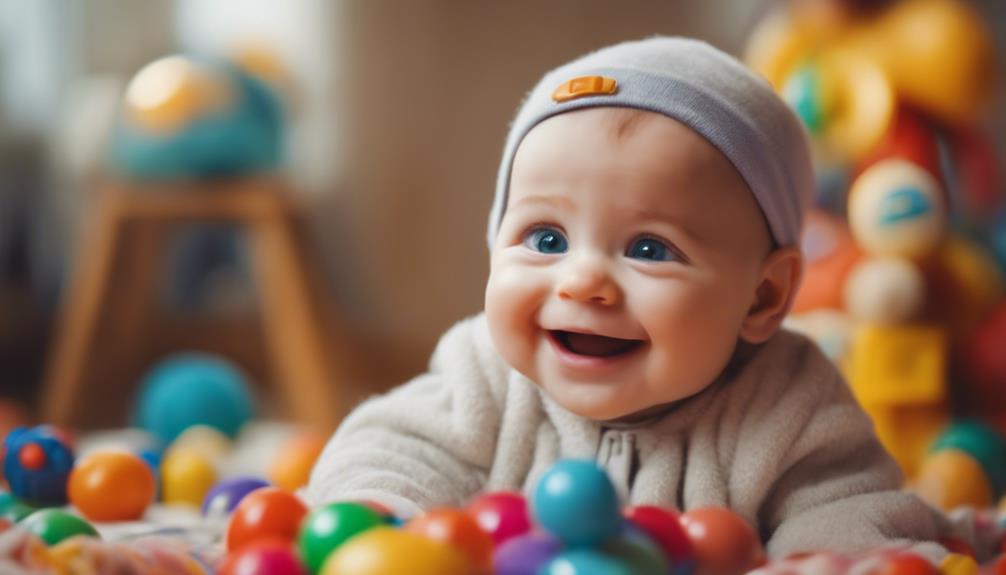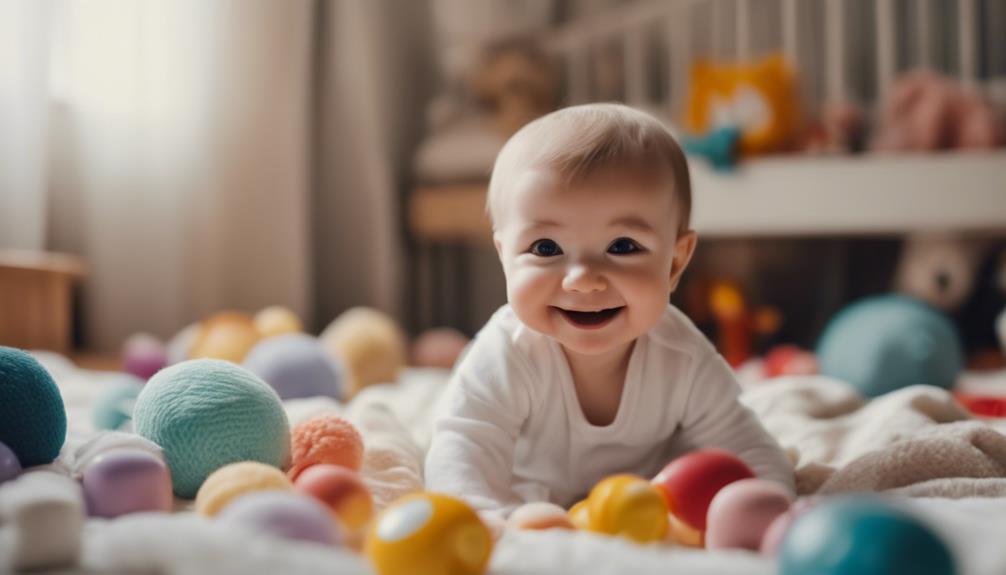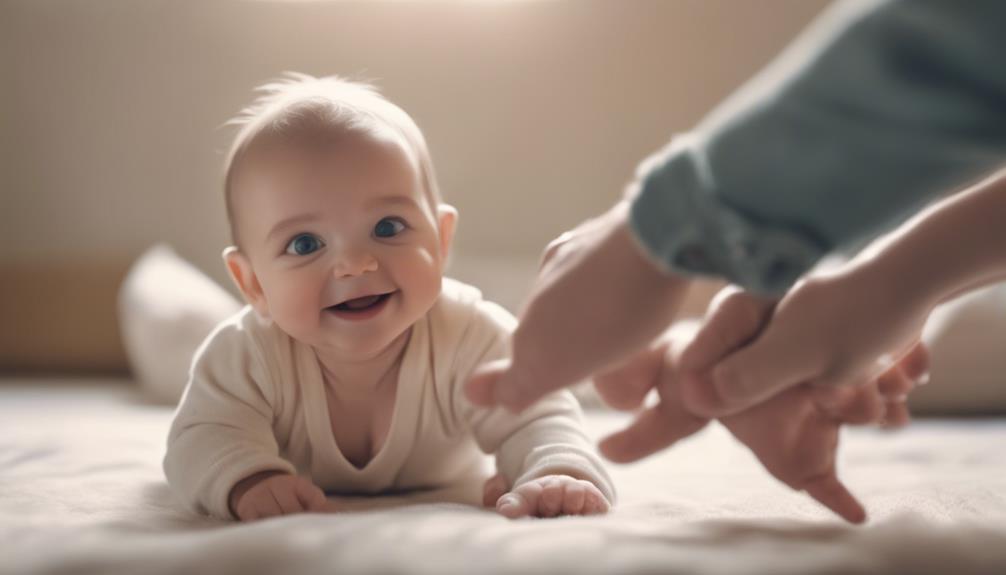Your baby’s continuous happiness can be influenced by genetic predispositions, early positive experiences, strong parental bonds, and nurturing emotional development. Genetic factors, positive interactions, and emotional resilience all play a part in shaping your baby’s cheerful disposition. In addition, creating a nurturing environment, engaging in playful activities, and showing affection can further enhance your baby’s happiness levels. Recognizing your baby’s cues, comforting them when necessary, and being attentive to their facial expressions and vocalizations are crucial in meeting their emotional needs. Together, these factors contribute to your baby’s ongoing joy.
Key Takeaways
- Genetic predisposition and positive early experiences contribute to a baby's happiness.
- Parental bonding, emotional development, and a nurturing environment impact a baby's cheerful demeanor.
- Frequent smiling, laughter, relaxed demeanor, and engagement with surroundings are signs of a happy baby.
- Positive interactions, affection, and a stimulating environment nurture a baby's emotional well-being.
- Understanding cues, soothing activities, observing expressions, and listening to vocalizations help cope with changes in baby's mood.
Genetic Factors in Baby Happiness
Genetic factors play a significant role in shaping a baby's overall happiness and temperament. Research indicates that some babies are born with a predisposition towards being a smiley baby or a happy baby due to inherited traits from their parents.
Certain genetic variations can contribute to a baby's baseline mood, affecting how they respond emotionally to various situations. These genetic predispositions can influence a baby's overall happiness levels, providing insights into why some babies seem consistently cheerful.
Understanding the genetic factors involved in a baby's happiness can shed light on the important interplay between nature and nurture in shaping a child's temperament. While early experiences and the environment also play vital roles in a baby's emotional development, genetic influences set the foundation for their innate happiness levels.
Early Experiences and Baby's Mood

Positive interactions with caregivers play a crucial role in shaping a baby's mood and overall happiness. Engaging with your baby through play, talking, and responsive care can foster a sense of security and well-being. Research by Dr. Smith, an assistant professor in child development, suggests that babies who smile a lot are often those who receive ample love, attention, and positive reinforcement from their caregivers. These early experiences help babies feel safe, loved, and content, leading them to exhibit a cheerful demeanor.
To emphasize the importance of positive interactions in shaping a baby's mood, consider the following table:
| Positive Interactions with Caregivers | Impact on Baby's Mood |
|---|---|
| Engaging in playtime activities | Creates feelings of joy and excitement |
| Providing responsive care and attention | Builds a sense of security and trust |
| Encouraging exploration and learning | Enhances cognitive and emotional development |
| Cultivating moments of happiness daily | Fosters overall emotional well-being |
| Creating a loving and nurturing environment | Ensures a happy and content baby |
With these nurturing experiences, you have nothing to worry about as your baby's cheerful disposition reflects the positive interactions and love they receive daily.
Influence of Parental Bonding on Baby's Happiness

Developing a strong bond with your baby can greatly influence their overall happiness and emotional well-being. When you nurture a secure attachment with your little one, you're setting the stage for a joy-filled journey ahead.
Here's how parental bonding can impact your baby's happiness:
- Consistent Comfort: Your baby feels safe and secure in your presence, which contributes to their happiness a lot of the time.
- Emotional Resilience: Through positive parent-child relationships, your baby learns to regulate emotions and find happiness even in challenging situations.
- Sense of Belonging: When your baby feels loved and supported by you, their happiness rights reserved to feeling connected and valued.
Understanding Baby's Emotional Development

To understand your baby's emotional development, it's essential to recognize the impact of positive interactions with caregivers and surroundings on shaping their happiness and well-being. Early childhood happiness plays a vital role in predicting future success in education and emotional well-being.
Research suggests that smiling and positive emotions in infancy not only reflect happiness but also play a key role in cognitive development and the acquisition of social skills. Simple activities such as play and bonding with caregivers can enhance your baby's happiness and overall emotional health.
By understanding your baby's emotional cues and responding positively to them, you can promote a happy disposition in your little one. These interactions lay the foundation for your baby's emotional development, influencing how they perceive the world around them and shaping their emotional responses as they grow.
Therefore, nurturing a positive and supportive environment can have a profound impact on your baby's emotional well-being and long-term happiness.
Signs of a Naturally Cheerful Baby

If your baby is naturally cheerful, you may notice frequent and effortless smiles, even without external triggers.
A consistently wide jawed smile and social responsiveness can be key indicators of your baby's happy disposition.
Observing your baby's continuous display of joy, especially when it contrasts with other siblings, can reassure you of their naturally cheerful nature.
Joyful Baby Behaviors
Moreover, a naturally cheerful baby often displays constant smiling, even in the absence of external stimuli.
Social smiling in response to interaction is a common behavior of a happy baby.
Continuous smiling for extended periods and persistent wide jawed smiles are signs of a joyful baby.
Contrasting behavior from siblings, with more smiles and joy, can indicate a naturally cheerful baby.
Excessive smiling, resembling excitement, is a key characteristic of a baby who's happy all the time.
Additionally, joyful babies tend to exhibit frequent laughter, even at simple gestures or sounds.
They may show excitement through kicking their legs enthusiastically, accompanied by high-pitched squeals of delight.
Moreover, happy babies often have a relaxed demeanor, displaying open body language and a willingness to engage with their surroundings.
These behaviors collectively contribute to the overall cheerful disposition that characterizes a naturally happy baby.
Positive Temperament Traits
Babies displaying positive temperament traits often exhibit consistent smiling and laughter throughout the day. A naturally cheerful baby may show ease in soothing, adaptability to routines, and quick recovery from distress.
Positive temperament traits in babies include being approachable, easily engaged, and showing interest in new experiences. Cheerful babies tend to have a higher threshold for frustration, leading to less frequent displays of negative emotions. They often demonstrate a strong ability to self-regulate their emotions, contributing to their overall positive demeanor.
These babies are known for their ability to maintain a happy disposition, even in challenging situations. Their adaptability and openness to new experiences make them a joy to be around. If your baby consistently shows these positive temperament traits, you can expect a generally cheerful and content demeanor, making parenting a more pleasant experience.
Strategies for Fostering Baby's Happiness

To foster your baby's happiness effectively, engage in frequent positive interactions and provide a stimulating environment for their development. This will help nurture a positive temperament and promote overall well-being.
Here are some strategies you can implement:
- Positive Interactions: Spend quality time engaging with your baby through cuddling, talking, and playing. These interactions create a sense of security and happiness for your little one.
- Stimulating Environment: Encourage learning by introducing age-appropriate toys, books, and activities. A rich environment stimulates your baby's senses and promotes cognitive development, contributing to their happiness.
- Acts of Kindness and Play: Incorporate acts of kindness like gentle gestures, soothing words, and playful interactions into your daily routine. These small but significant actions foster a loving bond and boost your baby's happiness levels.
Importance of Positive Interactions With Baby

Engaging in positive interactions with your baby is essential for their emotional development and overall well-being. These interactions play a vital role in establishing secure attachments and fostering emotional stability.
When you engage in playful activities with your baby, you not only strengthen your bond but also support their social and emotional growth. Babies thrive in environments where they're surrounded by love, attention, and positive reinforcement.
Regular interactions with your baby contribute immensely to enhancing their sense of security and overall happiness. By creating a nurturing and stimulating environment, you're laying the foundation for a happy disposition in your baby.
Nurturing Baby's Emotional Well-being

Establishing a nurturing environment for your baby is key to nurturing their emotional well-being. This environment can have a profound impact on your baby's happiness.
Here are three essential ways to foster your baby's emotional well-being:
- Positive Interactions: Engage in playtime activities, such as peek-a-boo or singing nursery rhymes. These interactions create a sense of security and love, contributing to your baby's continuous happiness.
- Affection and Responsiveness: Show your baby affection through cuddles, kisses, and gentle touches. Respond promptly to their needs and cues, building a strong emotional connection that enhances their well-being.
- Stimulating Environment: Create a nurturing environment by providing age-appropriate toys, colorful surroundings, and gentle music. Such an environment stimulates your baby's senses, promoting their emotional development and overall happiness.
Coping With Changes in Baby's Mood

When your baby's mood starts shifting, try to understand their cues by observing their behavior closely.
Providing comfort and security through soothing activities like swaddling or gentle rocking can help your baby feel more at ease.
Understanding Baby's Cues
Understanding a baby's cues is essential for parents to effectively cope with changes in their baby's mood. When your baby is happy, they may express it through smiles, coos, and positive body language cues, signaling contentment and joy. Conversely, signs of distress like crying, fussiness, or turning away could indicate discomfort or a need for attention.
To help you interpret your baby's cues better, consider the following:
- Facial Expressions: Pay attention to your baby's facial expressions for clues about their mood. A smile or furrowed brow can reveal a lot about how they're feeling.
- Body Language: Observe your baby's body language, such as kicking legs or clenched fists, as it can provide insights into their emotional state and needs.
- Vocalizations: Listen to the sounds your baby makes, whether they're cooing happily or crying inconsolably, to understand their communication cues better.
Providing Comfort and Security
To guarantee your baby remains happy and content, prioritize providing consistent comfort and security in their environment. Babies thrive on routine and predictability, which can help maintain their happiness. Creating a safe and nurturing space for your baby is essential for them to feel secure and content. Positive interactions and responsive caregiving play an important role in fostering your baby's continuous happiness. When your baby displays a happy disposition, it may indicate a strong attachment and sense of security in their surroundings.
| Importance of Providing Comfort and Security for Your Baby |
|---|
| 1. Consistent comfort and security contribute to a baby's happy demeanor. |
| 2. Routine and predictability help maintain a baby's happiness. |
| 3. A safe and nurturing environment fosters a baby's sense of security and contentment. |
| 4. Positive interactions and responsive caregiving play an essential role in nurturing a baby's continuous happiness. |
Frequently Asked Questions
Why Some Babies Are Always Happy?
Babies can be constantly happy due to genetic tendencies and positive surroundings. Factors like temperament, secure attachment, love, and responsive caregiving contribute to their joy. Interactions, attention, and a nurturing environment foster their happiness.
What Are the Signs of a Happy Baby?
You notice a happy baby through their constant wide smiles, especially when interacting with others. Social smiling, where they smile back at people, is a clear sign of joy. Having an overly happy baby is a blessing.
Do Happy Parents Make Happy Babies?
Happy parents make happy babies. Your positive vibes and interactions shape their emotional world, fostering joy and well-being. Your influence on their neural pathways from birth impacts their happiness. Your bond is their happiness.
Why Do Babies Bring so Much Joy?
Babies bring so much joy because their innocence, pure expressions of happiness, and contagious laughter uplift spirits. Their carefree nature, ability to find delight in little things, and secure relationships create a sense of wonder for you.
Conclusion
To sum up, your baby's constant happiness may be a combination of genetic factors, early experiences, and positive interactions with you.
Remember, fostering their emotional well-being is key to their overall happiness.
So keep up the good work, because with your love and care, your little one is as happy as a clam in a sea of joy.










